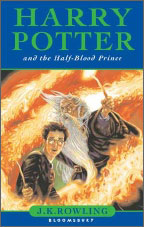 |
 J.K. Rowling
J.K. Rowling
Harry Potter and the Half-Blood Prince
Reviewed by: Nazalee Raja © 2005
Bloomsbury
Country Format Edition: UK, Hardback
ISBN: 0 7475 8108 8
Pages: 607 Price: £16.99
Publication date: 16 July 2005
Date Reviewed: 6 September 2005
Index:
Fantasy
General Fiction
Science Fiction
—Harry Potter and the Half-Blood Prince”, the penultimate book in J.K. Rowling’s series about the adventures of the eponymous boy wizard, is ostensibly for children but read and enjoyed by millions of adults worldwide (myself included). This sixth installment in the series can be read independently of earlier books as requisite background information is supplied. For those unfamiliar with the series (if any such person exists), it follows the adventures of a boy who discovers that he is a wizard after having been brought up in the world of muggles, or non-wizards. Harry further discovers that he has had to live with the Dursley family, Mrs Dursley being his mother’s sister, because his parents were killed trying to protect him from Lord Voldemort, also known as the Dark Lord. This is a wizard so evil, so feared, that the wizarding community dare only refer to him as —He Who Must Not Be Named”.
All of the above has already occurred by this book, which opens with a very British Prime Minister, not unlike Tony Blair, struggling to come to terms with the knowledge that there really are such things as magicians, giants, and dragons. On hearing that Voldemort is terrorising the world, he asks naïvely, —But for heaven’s sake — you´re wizards. You can do magic. Surely you can sort out — well, anything.” The new Minister of Magic gravely informs him, —The trouble is, the other side can do magic too, Prime Minister.” This sets the scene for the continuation of the epic battle between good and evil which the reader knows must surely follow. This is soon confirmed by news of a prophesy indicating that Harry might be —The Chosen One”, the wizard who can destroy Voldemort.
Each book in this series has been progressively darker, and this book is no exception, encompassing many typically adult themes such as death, revenge, grief and loss. This can also be seen more as a —coming of age” story than any of the previous works in the series. Harry and his friends are convincingly adolescent sixteen and seventeen-year-olds. Harry learns how and why he must accept the mantle of responsibility in order to terminate a sequence of events set in motion by the prophesy, and to avenge his parents death, but in arguably typical adolescent fashion, becomes distracted by other obsessions. Harry and his friends also learn to —apparate”, disappear from one place and appear in another, much as similarly-aged adolescents would take driving lessons and tests in England. They also, typically, fall in love and lust, and learn about the consequences of both.
Whilst it is true that the book would benefit from some editing, for the most part, the book is likely to be a rivetting read for younger readers, and an absorbing one for adults, gripping reader interest until its moving conclusion. The plot is simple, but not trite or predictable. For those readers familar with the series, complexity is added by use of imaginative details, such as the horcruxes, neatly linking to previous books, explain and tie-up loose ends, whilst simultaneously dangling hooks to tantalise the reader and pave the way for the final installment. Many of the issues which begin in the very first book, such has Harry’s rivalry with his schoolfellow, Draco Malfoy, and his enmity with his schoolteacher, Professor Severus Snape, reach a dramatic climax here, raising as many questions as are answered.
Voldemort´s early life is explored in some detail, and while some may feel that these areas could have been edited, I feel these sections add depth to the story, highlighting various parallels between Harry´s life and that of his nemesis, and emphasising what makes Harry special. As Dumbledore, the Headmaster of Hogwarts, the wizarding school, is at pains to point out, Harry, like Voldemort, could have become embittered by his childhood, but has chosen not to be.
This book, like the fourth in the serious, culminates with the death of a major character; one which is likely to upset many readers, regardless of age. This can only be an indication of the extent to which Rowling has convincingly animated the characters and the world they inhabit. —Harry Potter and the Half-Blood Prince” is unlikely to disappoint, and will wet the reader´s appetite for the concluding episode in this wonderfully imaginative series.
|
 |
